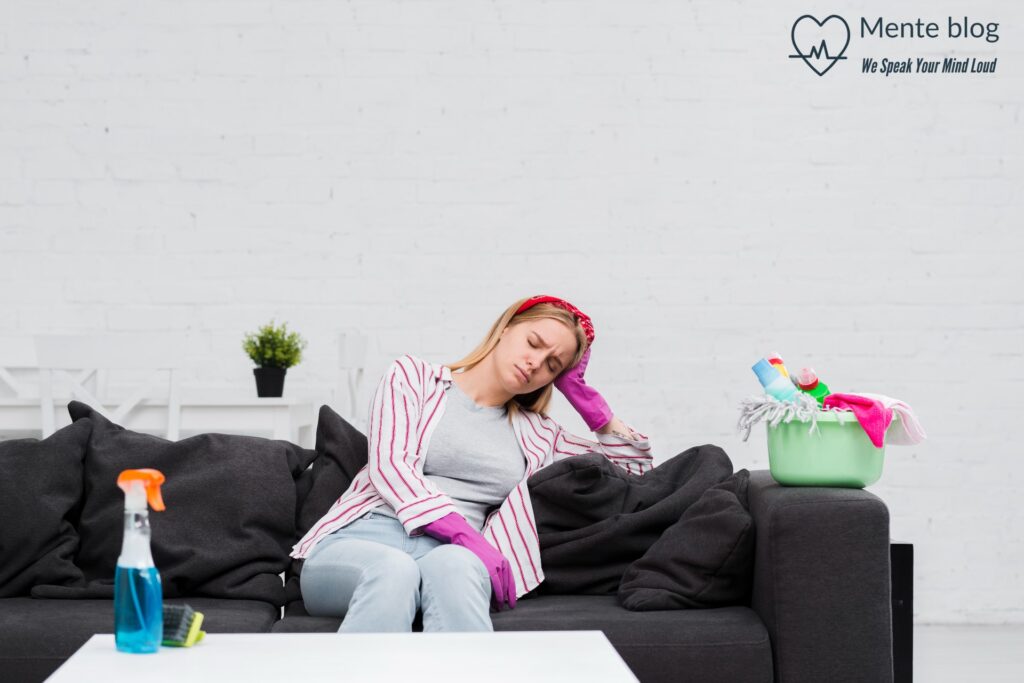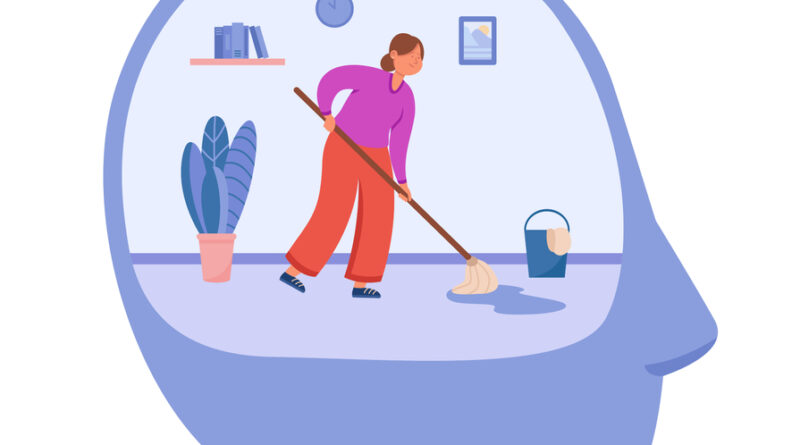“Clean your room, and you will feel better”- We probably all heard these words from our parents. Maybe we hadn’t realized the value of these words at that time, but now many adults will agree with those words. Cleanliness actually works. You know that our environments play a crucial role in our mental wellness. Be it cleaning your study table, your room, or your kitchen counter– cleaning and mental health are closely connected and offer a wide variety of benefits that you can’t ignore.
When some people feel stressed or overwhelmed, they might try yoga, a full-body massage, or mindfulness to feel better. For others, giving the shelves a quick dusting, cleaning the dirty dishes, or even organizing the closet can make them feel good. In fact, some people feel good or happy by staring at their organized home. There’s a close connection between cleaning and mental health. This blog is focusing closely on the impact of cleaning on your mental health.
Table of Contents
Poor Hygiene, Regular Cleaning and Mental Health

Keeping your home clean and taking part in the cleaning process is good for you. In fact, research also says that poor hygiene, cleaning and mental health have a direct impact on our overall lives.
- Clutter Can Cause Depression
According to a recent study published in “Personality and Social Psychology Bulletin,”, women with cluttered living spaces or unfinished projects were more likely to be depressed. On the other hand, women who have restful and restorative homes have a better state of mental health compared to the previous group of women. Also, researchers found that women with messy homes had higher levels of the stress hormone cortisol.
- Clutter May Cause a Decrease in Focus
According to Princeton University Researchers, clutter makes it difficult to focus on a specific task. A person’s visual cortex can be overwhelmed by seeing objects not related to a particular task, making it harder to concentrate on specific work and complete it efficiently.
Clutter, mess, or an unorganized living room are linked to negative emotions such as tension, irritation, and confusion. An organized living space can produce positive emotions like a sense of well-being and calmness and let the person feel good.
Clutter and mess refer to unfinished tasks, and they can make a person feel unproductive and not satisfied with themselves. Such a feeling can be highly stressful and affect their overall well-being as well as their thought process.
Clutter and mess can cause more anxiety and stress. However, by cleaning, organizing, and decluttering, people can transform their living space, feel more relaxed, and focus better on their important tasks.
5 Amazing Mental Health Benefits of Cleaning
Looking at an unorganized and messy room can put you in a mental bind. However, cleaning it can improve your mood and make you feel more positive and satisfied. Following are some of the amazing mental health benefits that no one told you about before.
- A Sense of Order & Control
Clutter is linked to procrastination, feeling stressed, and a lower quality of life. Actually, our outer environments act as containers for our emotional and psychic states. If order and structure are present in our outer environment, we feel more able to manage our internal feelings.
- Familiarity & Consistency
Human beings prefer stability over chaotic circumstances. Keeping your home organized and lean can help you experience that familiarity. ‘Order’ doesn’t mean you have to keep everything in line or follow color coordination. These senses may differ from one person to another. To experience familiarity and consistency, clean your living space and stay organized.
- Increased Endorphins
The physical act of cleaning can promote the production of endorphins. This is hugely beneficial as a pain and stress reliever. Leading an active and organized life feels so satisfying, ensuring your highest productivity level and well-being enhancement.
- Improved Focus
Having too many items in the field of our vision can distract the brain’s processing capacity. Decluttering your home can help your brain focus on items and tasks one at a time.
- Regulated Emotions
The physical act of cleaning allows us to slow down. It is highly beneficial to tackle situations when we feel overwhelmed. In this way, we give ourselves the required time to explore as well as manage our emotions. According to mental health specialists, deep cleaning can be a great way to reduce frustration and improve your mood.
How Can You Develop the Habit of Cleaning and Stay Organized?

Since home cleanliness and mental health are connected and can impact your entire life, you should develop the habit of cleaning and staying organized for your own good. Developing the habit of cleaning your room or home isn’t hard in any way. You just need to be consistent with your efforts.
Start Small
When your entire home is messy, it may feel too big to tackle. Also, you may feel like postponing the cleaning until you have enough time. And that time never comes! Instead of cleaning the entire house at once, start small and clean part by part. For example, one day you can organize the book yourself, the next day you can clean the kitchen counter, etc.
Set a Timer
For busy professionals, it is hard to manage lots of time every day to clean the home and keep things organized. For proper home cleaning without hampering your other tasks, set a timer. Set a realistic plan based on the timeline and do that efficiently. Initially, you can set a timer for 15 or 30 minutes and gradually increase that based on your requirements.
Involve Others
When the cleaning thing can’t be handled quickly or by yourself, seek help from others. Ask your family members to help you, or simply hire professional cleaners. Once the deep cleaning is complete, follow a simple routine for keeping things clean and in order. It will prevent your home from getting excessively cluttered, and you will feel good whenever you look at your home.
What If Cleaning Becomes a Compulsion?

There is nothing wrong with keeping your things and spaces clean, as it is also a great way to calm our nerves and reduce stress. However, it seems complicated when cleanliness becomes a compulsion. For example, if you cancel plans or other tasks just to clean your things and home, it can be a red flag. If you are not sure whether your cleaning habits are constructive or bordering on obsession, consult with an expert mental health doctor. A therapist can help you determine your healthy as well as toxic habits.
Read Our Previous Blog- Hair Fall Treatment: Top 5 Tips to Prevent Hair Loss in the Monsoon
Conclusion
Cleaning and mental health are two crucial factors in our lives. Cleaning and decluttering have the power to reduce our stress and anxiety and improve our mood. A messy home or workspace is distracting and can make you feel unsatisfied and less productive. Maintaining a cleaning regime is good; just ensure your habits are not a crutch, as you can’t solely rely on cleaning to bring consistency and predictability to your life.

